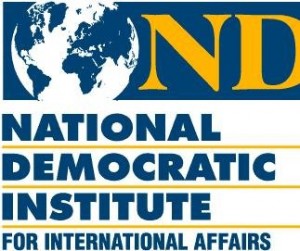 Tbilisi, DFWatch – The National Democratic Institute released the results of the latest survey which details Georgians’ political affiliations before the upcoming parliamentary elections in October 2016.
Tbilisi, DFWatch – The National Democratic Institute released the results of the latest survey which details Georgians’ political affiliations before the upcoming parliamentary elections in October 2016.
Ruling Georgian Dream still leads political parties’ ratings with 32 percent out of those who will go to the polling stations and have settled their choice, traced by United National Movement with 26 percent; The third place has been clinched by conservative Alliance of Patriots of Georgia with 7 percent, while newly formed State for People, a party led by famous operatic bass, Paata Burchuladze, came up on the fourth place with 6 percent of likely voters, pushing below electoral barrier Irakli Alasania’s Free Democrats, which held the third position in several previous polls.
All other parties performed below the barrier of 5 percent as well.
Only 38% of respondents claimed they were decided what party they would support in the elections. 57% claimed they were undecided. Still, 67% of respondents said they would likely vote if the elections were held tomorrow, while 33% declared they would abstain.
60% of respondents said that electoral platforms and promises were important or very important in voting decisions, 66% — Trust towards specific members of parties, 42% — Political opinion of the close people (family, friends), 32% — Parish and priest’s political opinion, 65% — Past performance of the party, 36% — The likelihood of a party winning, 18% — Opinion of the employer and colleagues, and 22% — Political opinion of popular people.
The majority of respondents said that party economic policy was the most important matter when voting (41%), followed by party stance on healthcare issues (14%), party stance on national security issues (11%), party stance on rule of law (9%), party foreign policy stance (8%), and party education policy stance (6%).
The respondents said that the biggest barriers to free and fair elections in Georgia were bribing (37%) and harassment (22%) of voters, problems with voters’ lists (15%), people voting more than once (15%), ballot stuffing (15%) one person voting for others (14%), unequal access to media for parties (13%), budget money being used unfairly in the election (13%), and voting a specific way to keep job (13%).
The poll also revealed 16% distrust towards international and 20% to Georgian election observers.
43% of respondents replied that the impact of increasing the number of women MPs on Georgia would be negative, while only 9% assessed that the impact would be positive.
DF Watch published results of the survey asking for political sympathies conducted among likely voters:
Which party would you vote for? (First choice)
17% Georgian Dream–Democratic Georgia
13% United National Movement
4% Movement State for People
3% Alliance of Patriots of Georgia
7% Other
5% No party
38% Don’t know
14% Refused to answer
How would you describe your support for your first choice?
1% Very weak
3% Weak
41% Average
38% Strong
17% Very strong
1% DK/RA
Which party would you never vote for?
21% United National Movement
19% Georgian Dream–Democratic Georgia
4% Georgian Labour Party
4% United Democratic Movement
2% Alliance of Patriots of Georgia
2% Republican Party
6% Other
15% No such party
21% Don’t know
8% Refused to answer
Planning to vote for the same political party/group you voted in 2012?
57% Yes
27% No
7% Did not vote / not planning to vote
6% Don’t know
4% Refused to answer

